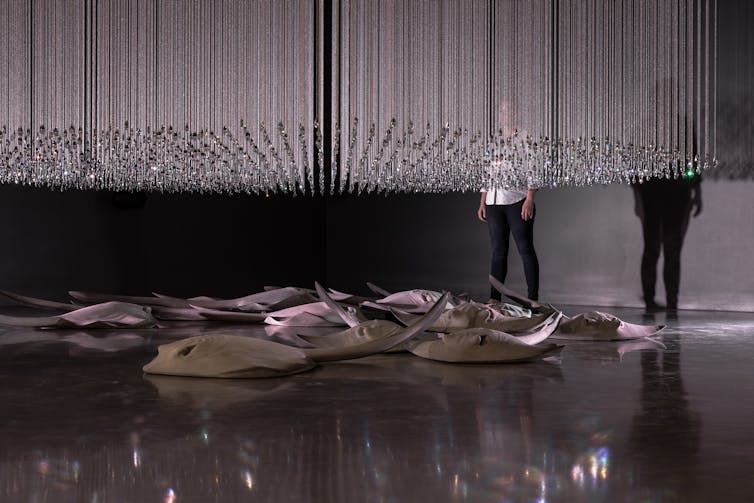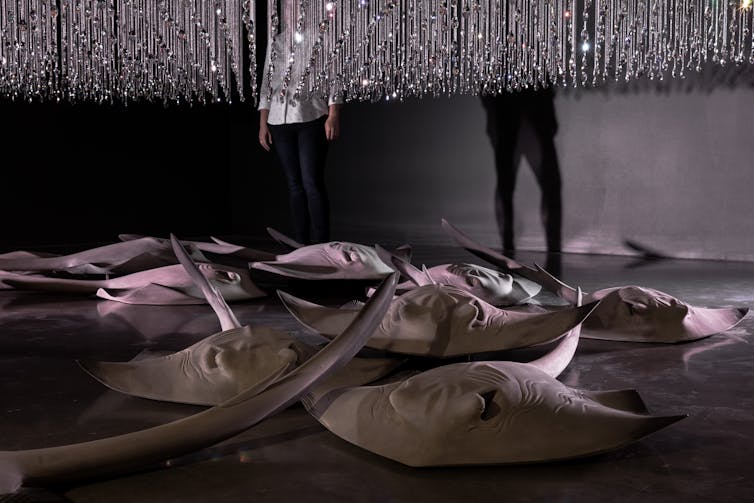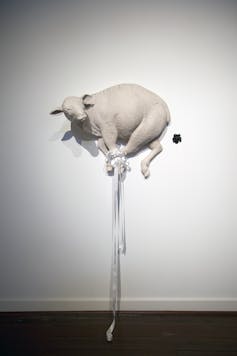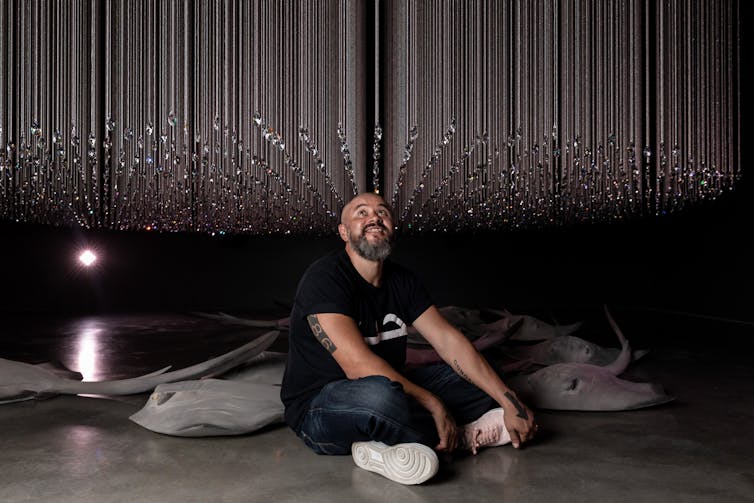In Abdul-Rahman Abdullah's Pretty Beach, a fever of stingrays becomes a meditation on suffering
- Written by Ted Snell, Professor, Chief Cultural Officer, Cultural Precinct, University of Western Australia
In our Here’s looking at series, experts explain prominent works of art.
Abdul-Rahman Abdullah’s fever of stingrays glide menacingly beneath a crystal sea. The installation Pretty Beach is instantly engaging; the seductive quality of the craftsmanship drawing you in close enough to hear the story the artist wants to tell. It is a story about growing up as a Muslim in Australia, being seen as different and coming to terms with fear and pain. It documents the changing patterns of his life.
His slippery, grey, swarming stingrays – currently displayed at the Museum of Contemporary Art, as part of the major exhibition The National – are a meditation on the suicide of his grandfather, who died ten years ago. He lived in a rambling home on the idyllic waterfront of Pretty Beach, on the Central Coast of New South Wales.
As the artist explains:
I remember standing out on the jetty as a kid watching groups of stingrays glide beneath me, tracing arcs through the shallow water. The rain drifted in like a soft curtain drawing across the bay, obliterating the rays from view as the surface of the water crumpled above them. I ran inside.
That memory is ensnared with brilliant effect in this work to capture the fear and anguish he felt on his grandfather’s death.
 Abdul-Rahman Abdullah, Pretty Beach, 2019, installation view, The National 2019: New Australian Art, Museum of Contemporary Art Australia, Sydney, painted wood, silver plate ball chain, crystals, audio, image courtesy the artist and Museum of Contemporary Art Australia.
© the artist, photograph: Jacquie Manning.
Abdul-Rahman Abdullah, Pretty Beach, 2019, installation view, The National 2019: New Australian Art, Museum of Contemporary Art Australia, Sydney, painted wood, silver plate ball chain, crystals, audio, image courtesy the artist and Museum of Contemporary Art Australia.
© the artist, photograph: Jacquie Manning.
The installation is centred around 11 swarming Estuary Stingrays, which glide beneath a sea of sparkling crystals, suspended on 1800 strands of ball chain. These strands mimic that cloud burst of rain activating the ocean’s surface with a flickering light.
The number 11 is significant in Sufi Muslim thinking because it represents the idea of meeting your creator, thus echoing the artist’s fear as a young boy. Acknowledging that fear of death, our movement through and around the installation triggers the shimmering of his crystal sea, placing us both actually and imaginatively within that space of revelation, terror and insight.
The installation creates a mystical environment of rain, sea and menacing depths. Surrounding walls are etched with a delicate drawing of shadows cast by the ball chain that creates a slowly pulsating shroud. Gallery lights ignite individual crystals as you move around the circular sea, first a white glow, then yellow, green and red. This luminous field holds your attention, while the stingrays congregate beneath in an elegant arabesque.
Read more: The National is a time capsule of new Australian art in uncertain times
 Abdul-Rahman Abdullah, Pretty Beach, 2019, installation view, The National 2019: New Australian Art, Museum of Contemporary Art Australia, Sydney, painted wood, silver plate ball chain, crystals, audio, image courtesy the artist and Museum of Contemporary Art Australia.
© the artist, photograph: Jacquie Manning
Abdul-Rahman Abdullah, Pretty Beach, 2019, installation view, The National 2019: New Australian Art, Museum of Contemporary Art Australia, Sydney, painted wood, silver plate ball chain, crystals, audio, image courtesy the artist and Museum of Contemporary Art Australia.
© the artist, photograph: Jacquie Manning
Abdullah is one of three brothers, who all drew and made visual responses to their world from an early age, adapting and appropriating from aspects of their Asian and Western heritage. Their Muslim faith has been influential in shaping their practice, and each has framed that experience within their work.
For Abdullah:
being a Muslim will always be a core aspect of my identity, it’s inescapable, and I’m very comfortable with that. Since 9/11 Islam was in the public realm, and we were the bad guys […] For me this polarisation of Muslim identity directly informs my practice, it’s really important for me to explore my own experience as an artefact of social change.

Embedded in family life and memories and intertwined with narratives from the Quran, his works induce a dreamlike musing on the power of objects and animals to evoke meaning.
His 2013 image of a lamb trussed for ritual slaughter by his father, a vivid memory from his childhood, is given the reassuring title I’ve Been Assured That You’re Going To Heaven My Friend, its execution undertaken with an air of sanctity that is seamlessly blended with blood, shit and meat.
Ritual and religion are entwined, the sacrificial lamb standing for all those innocents who make the ultimate sacrifice for others, willingly or not.
Prior to becoming an artist, Abdullah spent some years designing and building animal enclosures and sculptures at Perth Zoo. Animals have come to form an integral part of his practice – he is interested in the ideas about identity that animals allow him to explore.
 Abdul-Rahman Abdullah, Pretty Beach, 2019, installation view, The National 2019: New Australian Art, Museum of Contemporary Art Australia, Sydney, painted wood, silver plate ball chain, crystals, audio, image courtesy the artist and Museum of Contemporary Art Australia.
© the artist, photograph: Jacquie Manning
Abdul-Rahman Abdullah, Pretty Beach, 2019, installation view, The National 2019: New Australian Art, Museum of Contemporary Art Australia, Sydney, painted wood, silver plate ball chain, crystals, audio, image courtesy the artist and Museum of Contemporary Art Australia.
© the artist, photograph: Jacquie Manning
Delving deep into his memories of childhood, Abdullah creates experiences that involve the viewer physically, moving in and around objects in a particular space to heighten the alternative sense of reality he generates through his skillful re-interpretation of his animal subjects.
The artist’s grandfather took his life in 2009, after years of suffering. Pretty Beach provokes us all to confront our sense of mortality – and to ponder how that knowledge might shape our lives.
Abdul-Rahman Abdullah’s Pretty Beach is on at the Museum of Contemporary Art Australia until June 23.
Authors: Ted Snell, Professor, Chief Cultural Officer, Cultural Precinct, University of Western Australia





